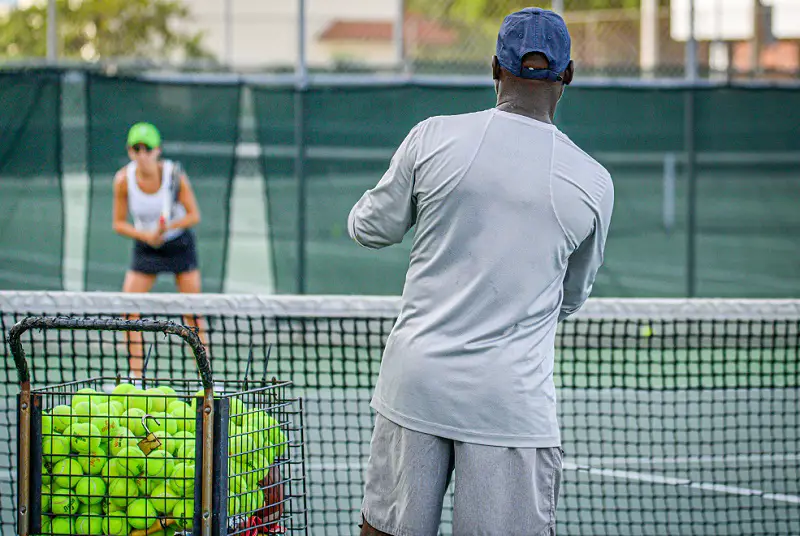If you are looking to make tennis coaching your career, or if you want to hire a tennis coach and want to understand what are the roles and responsibilities associated with one, we have laid it all out for you below.
Playing any sport professionally is a commitment that most people make early in life to be the best player possible.
In any sport, a good coach is a necessity. As a result of their work, these individuals teach, guide, train, and prepare young athletes for a career in sports.
Evidently, they need the qualities and qualifications that will allow them to do so.
This article looks at the specific roles and responsibilities of a tennis coach.
Note: It might surprise you just how much they do for their trainees!
Table of Content
What is the Role of a Coach?
Each type of sport has a variety of coaches. Team sports have team coaches that each have a particular specialty. For example, you will have batting and pitching coaches in baseball.
For individual sports like tennis, you have a single coach that trains the player.
Their specific role depends on the requirements of their trainees. Tennis coaches provide training to introduce budding players to the sport, help players improve their skills, and compete in tournaments.
They can make coaching plans for people based on their skills and what they want to accomplish.
A good coach must also love the game and care about the people they teach.
Also Read:
Responsibilities of a Tennis Coach
A tennis coach has multiple responsibilities that require various skills. Let’s look at some of their core responsibilities.
The Training and Developing Skills of Tennis Players
A tennis coach’s primary responsibility is to develop their trainees’ skills. They are able to draw on their own experience and training styles to ensure that their trainees are doing their best.
Coaches develop skills according to a person’s requirements, which usually revolve around why they want to play tennis. The goals of those who want to play professionally will be utterly different from those of someone who wants to join the local tennis club for fun.
This is why a tennis coach will have a different approach for different trainees. They will understand what they need and how to train them to get results.
Identifying Areas of Improvement
A tennis coach must be able to identify areas that a trainee needs to work on to improve. They must have the experience to see their trainee’s weaknesses and address them.
This not only requires keen observation but also requires the coach to be able to communicate effectively with their trainee.
Developing Training Programs
No two people will have precisely the same training program. This is because everyone has different skill levels and different goals.
A tennis coach needs to be able to evaluate a trainee’s skills, figure out where they need to improve, and come up with a training plan to work on those areas.
Have a Definite Coaching Method
It is the job of tennis coaches to work on themselves and improve their coaching styles. Just as every trainee will have a different skill level, they will also have different communication styles.
As much as a coach cannot always change themselves or their personalities, they can be conscious of what works and what does not. Some trainees need a softer approach, while others prefer it if their coaches push them harder.
This is why it takes some time to find the perfect match between trainee and coach.
Attend Trainee’s Matches
A tennis coach must attend various matches to assess a trainee’s progress and identify which areas they need to work on.
They must watch their trainees play outside of their coaching sessions, with different opponents, and under diverse conditions.
Communicate with Parents/Guardians
It is also the coach’s responsibility to communicate with the parents and guardians of their young trainees. Many people enlist the services of a private tennis coach to help their young children hone their sports skills.
Tennis coaches need to keep parents informed of their child’s progress and address any issues that arise during training sessions.
Also Read:
Ideal Requirements of a Tennis Coach
A tennis coach should have unique skills and qualifications that enable them to do their job and address their responsibilities.
A Genuine Love of the Sport
A tennis coach should love tennis. Just as a tennis player is passionate about the game, a tennis coach must be equally invested.
No one wants a tennis coach who despises tennis or is resentful that they cannot play themselves. A love for the sport will spur them on and allow them to do their job without boredom.
In addition, when a coach genuinely loves the game, it will motivate them to work harder to see their trainees do well in a sport they both love.
Professional Qualification is Preferred
Ideally, a tennis coach should have sports management or physical education qualifications. This gives them a better foundation for their role.
Furthermore, certification from the United States Professional Tennis Association (USPTA) or the Professional Tennis Registry (PTR) is a huge advantage.
Not only will these qualifications enable coaches to do their job, but they will also attract trainees looking for a professional coach.
First Aid Training
First aid training is a beneficial skill to have as a coach. Even though tennis is not a contact sport, accidents happen.
Being able to address these issues quickly can prevent severe complications due to injuries.
Communication Skills
A coach needs good communication skills to communicate with their trainees, parents, sports agents, and medical personnel. They are sometimes the voice of their trainees, advocating for them when they can’t do it themselves.
Therefore, a coach must know how to communicate effectively and communicate their point without chaos.
If they cannot communicate effectively, they will not have a good relationship with their trainee, and improvements will not happen smoothly.
Understanding
A good tennis coach has a degree of empathy for their trainees. It’s not easy when you are training to be a professional tennis player. Long training sessions, grueling matches, and a determination to be the best can be tiring.
A tennis coach will probably spend the most time with their trainee and get to know them better than anyone else. Thus, they must be mindful of when they need a break and when they need to push harder.
What to Consider When Choosing a Tennis Coach
Now that you know what a tennis coach does and what requirements they should have, let’s see what you need to consider when choosing one.
The decision is always challenging, and it will take a while to find the perfect coach. However, three main factors will help you make your decision.
Reputation
The first thing you need to check when looking for a tennis coach is their reputation. Recommendations from others, visible results, and qualifications are essential.
These will give you a better idea of what they are capable of and whether they can help you achieve your tennis goals.
A good coach will have a good track record, and if there have been problems with past trainees, they will be transparent about it. Not every coach-trainee relationship will work out, but that should have nothing to do with a coach’s reputation.
Skill Level
Depending on your age and skill level, you want to select a coach who can help you improve. Therefore, you need a coach with a higher skill level than you.
Not all coaches can take you to the very top of your game, but they may be what your current age group requires. Thus, you must now decide on the right coach for your skill level and age group while also considering your future options.
Compatible Personality
Everyone is different and is the product of their life experiences. A tennis coach must be compatible with their trainee. You can’t have a sensitive coach working with a tough trainee who demands results.
Like any relationship, it is important that a coach takes the time to understand their trainee and coaches them accordingly.
This will guarantee that they can communicate effectively and achieve the desired results.
Final Words on Roles & Responsibilities of a Tennis Coach
A tennis coach is an integral part of a tennis player’s life. They become players’ mentors, friends, and confidantes in many ways.
Not only will a great tennis coach help you improve your skills, but they will also prepare you for the future of playing tennis. Not all coaches will be compatible with trainees.
You must choose a coach with relevant experience to help you achieve your current goals.
Often, you won’t have the same coach forever, but they will still form the foundation of your relationship with tennis and your journey as a player.


